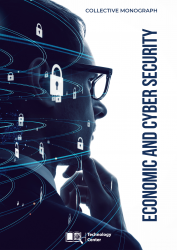Semantic role labelling and analysis in economic and cybersecurity contexts using natural language processing classifiers
Keywords:
arithmetic comparison, computer systems for processing integer economic data, cyberattacks, cybersecurity, cyber protection, data comparison methods, financial losses, information security, modular number system, non-positional number system, nulling constants, positional features of a non-positional code, single-line binary code, threats, strategically important enterprises, security, economic security, state regulatory policy, business environment, martial law, financial support, institutional support, semantic role labelling, nlp techniques, economic data analysis, cybersecurity text mining, semantic role extraction, sentiment analysis, financial security, management of the financial security system, monitoring of financial security, national security, linear economy model, sustainable development, innovative development, circular economy, innovative system, innovative infrastructure, evolution of the circular economy, business model of a closed cycleAbstract
Semantic Role Labeling (SRL) is a crucial task in Natural Language Processing (NLP) that plays a vital role in extracting meaningful information from text. In the fields of economics and cybersecurity, accurately identifying and analyzing semantic roles within text is crucial due to the rapid increase in the amount and complexity of textual information. This abstract examines the significant role of SRL and its application in economic and cybersecurity contexts. It discusses the state-of-the-art NLP classifiers used for this purpose. By examining the relationship between language processing and these important areas, we aim to emphasize the importance of SRL in extracting useful information and improving decision-making in a constantly changing digital environment.
The aim of the findings is to emphasize the significance of SRL in extracting valuable insights from text, as it serves as a fundamental technique in NLP. It is utilized in the economic context to analyze financial reports, news articles, and economic texts. It assists in decision-making and market analysis. It aids in identifying important participants, actions, and objects in economic discourse, leading to better decision-making and market analysis. In the field of cybersecurity, SRL assists parse and comprehending text data related to security, enabling faster responses to threats. NLP classifiers and machine learning models utilize SRL to automate the analysis of large amounts of text. These techniques are practically significant as they improve the ability to extract actionable insights, assess risks, and make informed decisions by organizing unstructured text data.
The process of determining relevant information from a large corpus of data requires an optimal methodological basis. Relevant textual data is collected from sources such as financial reports, news articles, or cybersecurity incident reports. Textual data is cleaned, tokenized, and tagged with part-of-speech labels in preparation for NLP analysis. Human annotators label semantic roles in the text, identifying actors, actions, and objects. This creates a dataset that can be used to train classifiers. NLP classifiers, including machine learning models, are trained using annotated datasets to identify semantic roles. The accuracy and performance of the trained classifiers are evaluated using various metrics. NLP classifiers are used to automatically identify and label semantic roles in new, unseen textual data. The output helps extract insights, such as market trends or security threats, depending on the specific field. Researchers improve classifier models by iteratively training and applying them to increase accuracy.

ECONOMIC AND CYBER SECURITY
Downloads
Pages
Published
License

This work is licensed under a Creative Commons Attribution-NonCommercial-NoDerivatives 4.0 International License.

